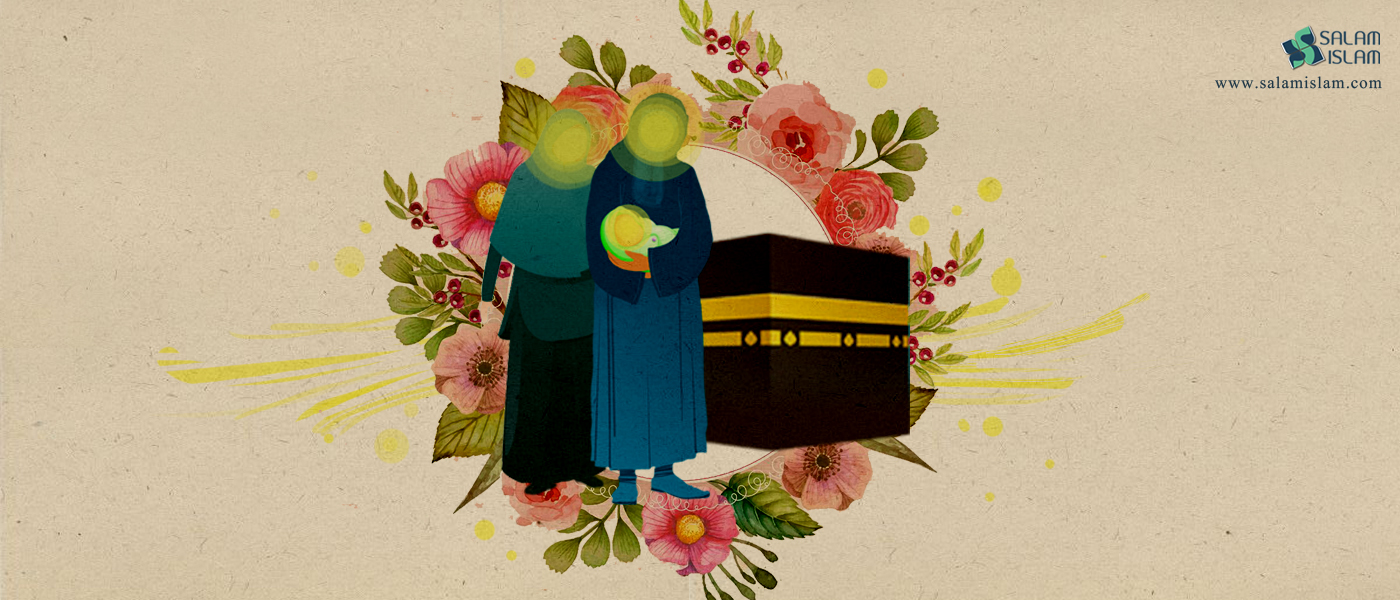

What Are the Solutions to Depression and Stress in Islam: Part2
In the first part of the article, some stress relieving practices were discussed. Here we complete the list with other advises proposed for facing stress in Islam.
Visiting Family and Gathering with Friends, especially Believers and Those of the Same Religion
Isolation is undoubtedly the worst way to deal with depression, although some have a completely opposite view on this matter. In general, upholding kinship with relatives and visiting them regularly, benefits one from their social and emotional support [1]. And particularly, in the case of having a problem as serious as depression, they will not leave their loved ones alone and will help to find the resources to get him/her treated. That’s why keeping family ties is strongly emphasized and recommended in Islamic teachings [2].
Gathering frequently with supportive friends can also play a big role in making depression more manageable and relieving stress in Islam. In Islamic resources, trustworthy friends are known to be like one’s eyes and hands, and family and properties of a person; they are rare and invaluable [3], and they can help a lot to deal with such disorders.
Marriage in Islam
It is stated in Surah Rum that God has created mates for the human beings which are the source of solace and comfort to them (30:21). Prophet Muhammad (PBUH) said that after Islam, nothing is more beneficial than a righteous, kind, Muslim wife who brings a smile to the face when looking at her [4]. That is within a lawful (Halal) marriage that both sides receive pure affection and emotional support from each other; respond safely to their sexual urge; help and encourage each other to achieve their goals, promote their social statue and get a better economic situation. Moreover, the researchers suggest that marriage provides the companionship and emotional support needed to help alleviate depression [5]. Hence, many of one’s worries might fade in a successful marriage [6].
Taking on a Nice Appearance, A way of Relieving Stress in Islam
Looking clean and nice is one of the manners of Prophet Muhammad (PBUH). It makes one look good, feel good, be confident and attract the company of people and their respect which consequently helps one’s stress to be healed. Prophet Muhammad (PBUH) used to put on perfume and always advised others to do so [7]. On the contrary, looking disheveled has always been blamed in Islamic teachings and narrations since it is believed that one should make the most of the blessings of life [8]. The effect of having a clean and nice appearance and smelling good manifests itself in a healthy, joyful individual [9].
Healthy Entertainments and Physical Activities to Face Stress in Islam
Doing sport and healthy entertainments are highly advised in Islam due to its wonderful benefits on one’s peace and success. Prophet Muhammad (PBUH) said that a wise person divides his daily schedule to four parts and dedicates one of them to lawful (Halal) and healthy entertainment which comforts heart and mind [10]. Imam Ali (AS) has emphasized the impacts of cheerful moments and the state of being happy on one’s soul and mind, too [11, 12]. However, entertainment should not be confused with useless activities. Doing sports especially horse riding, shooting and swimming are encouraged in Islam [13, 14]. On the contrary, playing marbles, gambling or any kind of activity with the intent of winning money or material goods [15], and any entertainment which is a waste of time (like sitting in front of the TV all day and doing nothing else) are absolutely forbidden. That is due to the fact that one gains nothing for doing such activities but loses time and energy, and Muslims are warned neither to lose nor to cause damage.
Acts of Charity
One of the psychological impacts of giving charity is the joy that the donor will experience in his/her heart. Acts of charity and helping others might happen in several forms, like watering a plant, teaching, helping deaf (without nagging and complaining) to communicate with others and being tolerant towards people [16]. In Surah Baqara, it is said that those who spend their wealth in the way of Allah, will be surely rewarded by their Lord. Moreover, they will not fear, nor will they grieve (2:262).
References:
- A. Javadi Amoli, “Mafatih al-hayat”, p. 216.
- what does islam say about maintaining family ties
- M. al-Kulaynī, “Al-Kafi”, vol. 2, p. 248.
- Shaykh Tusi, “Tahdhib al-ahkam fi sharh al-muqni'a”. vol. 7, p. 278, T. 4.
- Frech, A. and Williams, K., 2007. Depression and the psychological benefits of entering marriage. Journal of Health and Social Behavior, 48(2), pp.149-163.
- stress in life
- M. al-Kulaynī, “Al-Kafi”, vol. 6, p. 510.
- A. Javadi Amoli, “Mafatih al-hayat”, p. 164.
- H. F. Tabarsi, “Makarim al-akhlaq”, p. 42.
- Shaykh Sadouq, “Ma'ani l-akhbar”, p. 334.
- “Ghurar al-Hikam wa Durar al-Kalim”, T. 3992.
- “Ghurar al-Hikam wa Durar al-Kalim”, T. 3993.
- Al Suyuti, “Jami al-saghir”, vol. 1, p. 38.
- Al Suyuti, “Jami al-saghir”, vol. 1, p. 627.
- Ibn Babawayh, “Al-Khisal”, p. 331.
- A. Javadi Amoli, “Mafatih al-hayat”, p. 547.
Share This Article

Prophet Muhammad (PBUH&HP) and Her Daughter, Lady Fatima (AS)
Before she was born, both Prophet Muhammad (PBUH&HP) and lady Khadija (AS) went to a spiritual retreat separately for forty days by the command of Allah. During those days, Prophet Muhammad (PBUH&HP) and Lady Khadija (AS) prayed Allah sincerely and prepared their pure soul to receive Allah's blessing, their beloved daughter. After those forty days of worship and servitude, angels brought Prophet Muhammad (PBUH&HP) an apple from heaven, and he broke his fast with those gifts from Allah. That night Lady Fatima (AS) was formed [1].
The father-daughter relationship between Prophet Muhammad (PBUH&HP) and Lady Fatima (AS) was one of a kind. Here, we are going to exemplify some instances of deep father-daughter love between the two and the formation of an ideal respectful relationship.
1. Respecting and Loving Lady Fatima (AS)
Prophet Muhammad (PBUH&HP) was always affectionate and caring toward Lady Fatima (AS). He used to kiss her throat every time she returned from a trip [2]. In response, she used to hug her dear father and kiss his forehead, between his eyes [3]. He didn't get to sleep before kissing her cheeks and praying for her, which reveal his deep respect and fatherly love toward her [4]. Aisha said she was the most similar person to Muhammad (PBUH&HP) in her speech. Whenever she came to see Prophet Muhammad (PBUH&HP), he used to take her hand and kiss her and sat next to her, and whenever Prophet Muhammad (PBUH&HP) went to meet Fatima (AS), she used to kiss his hand and sat next to him respectfully [5].
2. Lady Fatima (AS), The Mother of Her Father (Umme Abiha)
Lady Fatima (AS) lost her mother when she was five. The other five years of her life passed without a mother. As a daughter, she used to take care of her father. Whenever the unbelievers threw him stones and ashes, Fatima (AS) used to take care of him and do what a mother does for her child. That is why when Allah asked Prophet Muhammad (PBUH&HP) to call his wives Umol-Mumenin (Mother of the Believers), she asked him to grant her a title, too, Then Prophet Muhammad (PBUH&HP) called her Umme Abiha, the mother of her father [6].
3.The Event of the Cloak
Prophet Muhammad (PBUH&HP) was at home, resting, with his cloak over his body. Fatima (AS) came beside him with some food. Prophet Muhammad (PBUH&HP) asked her to call her husband, Ali (AS), and her two sons, Hassan (AS) and Hussain (AS). They started eating together when Allah inspired this verse to his Prophet:
"Stay in your houses and do not flaunt your finery like the former [days of pagan] ignorance. Maintain the prayer and pay the zakat, and obey Allah and His Apostle. Indeed, Allah desires to repel all impurity from you, O People of the Household, and purify you with a thorough purification." Quran (33:33)
Then Prophet Muhammad (PBUH&HP) covered the four of them with the remaining of his cloak and prayed:
O Allah, these are the people of my household and my special ones. Keep them pure and clean and take all evil away from them [7].
4. Attached, Even in the Other World
Prophet Muhammad (PBUH&HP) used to know about the difficulty of Lady Fatima's (AS) life after his death and the cruelty imposed on her and her family, and he cried for that a lot. Once when she was crying, he inspired her with this news: "You will join me in the other world soon after" [8] Lady Fatima (AS) was martyred 95 days after the death of his father!
References:
- Naseri, Muhammad (2011), Prophet Muhammad's Behavior with Fatima, Farhang-e Kothar, vol. 81.
- Bihar al-Invar, Vol.43, p. 6.
- ibid, p 40.
- ibid, p 42.
- Amini, Ibrahim The Model Woman of Islam, Fatima Pp108-109.
- Qa'emi, Ali In Fatima's School p.90.
- Tabatabai, Muhammad Hussain, Tafsir Al-Mizan Vol. 16, P 474
- Qomi, Abbas, Montahal Aamal p164.
Read More

14 Prophet Muhammad (PBUH&HP) Quotes about Lady Fatima (AS)
1. Loving Lady Fatima (AS)
Whoever loves my daughter, Fatima (AS), will be with me in heaven, and whoever holds grudges against her will reside in hell.
Bihar al-Anvar, vol.27, p.116.
2. The Best in Worshiping Allah
Fatima (AS) is the best companion in the path toward serving and worshiping Allah.
Bihar al-Anvar, vol.43, p.117.
3. The Dearest
Fatima (AS) is the dearest of people to me.
Al-Shaykh al-Saduq, Al-Amali, p.259.
4. Lady Fatima (AS), the Joy of Her Father's Heart
Fatima is of my flesh, who is the light of my eyes and the warmth of my heart.
Al-Shaykh al-Saduq, Al-Amali, p.486.
5. Injustice to Lady Fatima (AS)
Woe to whoever does wrong to my daughter, Fatima (AS), after my death.
Bihar al-Anvar, vol.73, p.354.
6. Paying a Visit to Lady Fatima (AS)
Visiting Fatima (AS) equals to visiting me.
Bihar al-Anvar, vol.43, p.58.
7. Part of Her Father, Prophet Muhammad (PBUH&HP)
O’ Fatima (AS)! You are part of me, and I part of you.
Bihar al-Anvar, vol.43, p.32.
8. Prophet Muhammad (PBUH&HP)'s Deep Love for Her
O’ Fatima (AS)! I’m ready to give my life for you!
Bihar al-Anvar, vol.22, p.490.
9. A Heavenly Angel
Fatima (AS) is an angel who smells like heaven.
Bihar al-Anvar, vol.87, p.112.
10. An Avid Worshipper
Verily, Allah has poured faith and belief into the veins of Fatima (AS); thus, she is consistent in worshiping Allah.
Bihar al-Anvar, vol.24, p.74.
11. Lady Fatima (AS)'s Marriage
I did not give permission for Fatima (AS)’s marriage until I received Allah’s command as to her marriage.
Al-Shaykh al-Saduq, Uyoun Akhbar Al-Ridha, vol.2, p.59.
12. Lady Fatima (AS)'s Status
My daughter’s light is of Allah, and her status is higher than heaven and earth.
Bihar al-Anvar, vol.15, p.10.
13. The Four Honored Women
Heaven looks forward to four women: Mary, the daughter of Joachim, Asyia, pharaoh’s wife, Khadija, Khuwailad’s daughter, and Fatima (AS), Muhammad (PBUH&HP)’s daughter.
Bihar al-Anvar, vol.43, p.53.
14. Asking Allah's Pardon for Others
O’ Fatima! I give you the glad tiding of holding a high status in Allah’s regard, which provides you with the power to ask pardon for other people.
Bihar al-Anvar, vol.76, p.359.
Read More

